Is 'natural' immunity any better than vaccine immunity to COVID-19?
Tagged:COVID
/
JournalClub
/
MathInTheNews
Periodically, anti-vaxxers will say they prefer the ‘natural’ immunity acquired by recovering from a disease, because vaccines are ‘artificial’. Is that likely to be true for COVID-19? In a word: NO.
‘Natural’ immunity isn’t as great as you think it is
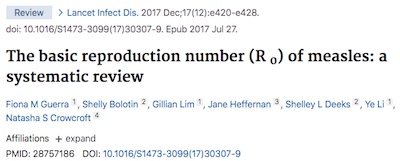 The experience of having a disease is miserable, sometimes maiming or fatal. For going
through that, you usually get immunity. Usually. Sometimes you get the reverse, called
immune amnesia. Measles, for example, can reset your immune system so you lose
immumity for a couple years to everything except the measles you just had.
[1] That, combined with the miserably high infectivity of measles
(R0∼12−18) [2], emphasizes
how important it is to get MMR vaccinations for your kids. And yourselves, for that
matter.
The experience of having a disease is miserable, sometimes maiming or fatal. For going
through that, you usually get immunity. Usually. Sometimes you get the reverse, called
immune amnesia. Measles, for example, can reset your immune system so you lose
immumity for a couple years to everything except the measles you just had.
[1] That, combined with the miserably high infectivity of measles
(R0∼12−18) [2], emphasizes
how important it is to get MMR vaccinations for your kids. And yourselves, for that
matter.
What’s the efficacy of ‘natural’ immunity to COVID-19?
Generally speaking, that’s the way the trade-offs go: vaccines are almost always the low-risk way to go to get disease immunity, at least compared to getting sick with the disease itself. What do we know about how this will shake out for COVID-19?
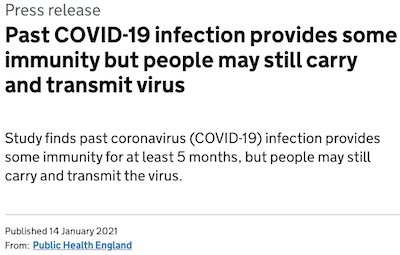
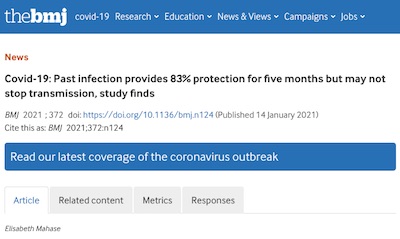
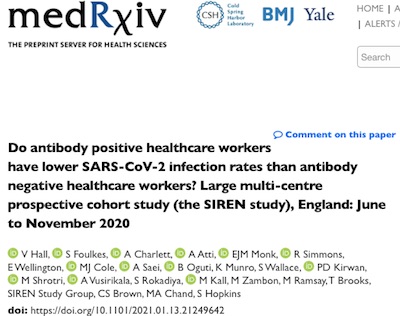 Last week, a press release from Public Health England [3],
an agency of the UK government, gave us the answer. This was confirmed by reporting from
the British Medical Journal, in a news report by Elisabeth Mahase
[4].
Last week, a press release from Public Health England [3],
an agency of the UK government, gave us the answer. This was confirmed by reporting from
the British Medical Journal, in a news report by Elisabeth Mahase
[4].
They’re looking at the SIREN study [5], which looked at infection rates in healthcare workers in the UK. SIREN compared infection rates in antibody-positive subjects (presumably recovered from COVID-19) to antibody-negative subjects (presumed COVID-19 naïve).
The general conclusion of the SIREN study, the scientific source for all this reporting, is:
Interpretation A prior history of SARS-CoV-2 infection was associated with an 83% lower risk of infection, with median protective effect observed five months following primary infection. This is the minimum likely effect as seroconversions were not included.
So, to summarize:
- Going through the harrowing, life-threatening, hospital-breaking experience of getting COVID-19 gets you immunity with 83% efficacy.(Probably higher, because of unmeasured seroconversion.)
- Going through only moderate aches & pains, imposing minimal burden on the healthcare system by getting a vaccination with the Moderna/Lonza or Pfizer/BioNTech vaccine gets you immunity with 95% efficacy.
For the mathematically disinclined, we would like to point out that 95% > 83%.
The moral of this story
When your turn comes up, get vaccinated!
Added 2021-Jan-19: Masks alone, properly worn, give 70% - 80% efficacy
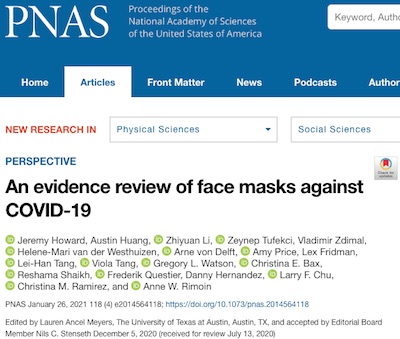 A review of the effect of mask-wearing on COVID-19 just published in the Proceedings of
the National Academy of Sciences [6] rather helpfully points
out that using face masks can get you efficacies for preventing COVID-19 of around 70%,
and as much as 80% if you just follow the instructions and wear them properly:
A review of the effect of mask-wearing on COVID-19 just published in the Proceedings of
the National Academy of Sciences [6] rather helpfully points
out that using face masks can get you efficacies for preventing COVID-19 of around 70%,
and as much as 80% if you just follow the instructions and wear them properly:
Overall, evidence from RCTs and observational studies is informative, but not compelling on its own. Both the Australian influenza RCT and the Beijing households observational trial found around 80% efficacy among compliant subjects, and the one SARS household study of sufficient power found 70% efficacy for protecting the wearer.
Wearing a mask properly means over your nose too. In the (regrettably now-immortal) words of NY Gov Andrew Cuomo, if you wear the mask under your nose, “That’s not a mask. That’s a chin strap. Nobody told you to wear a chin strap.” Don’t be a dope about this.
You can get 80% immunity if you wear your mask properly when out of your home, and that’s almost as good as the 83% immunity you get from the agonizing process of having COVID-19 itself.
Neither is as good as 95% immunity from the Pfizer or Moderna vaccine, so get vaccinated.
Notes & References
1: A Hagen, “Measles and Immune Amnesia”, American Society for Microbiology, 2019-May-18. ↩
2: F Guerra, et al., “The basic reproduction number (R0) of measles: a systematic review”, Lancet Infectious Diseases, 2017 Dec;17(12):e420-e428. DOI: 10.1016/S1473-3099(17)30307-9. Epub 2017 Jul 27.↩
3: Public Health England, “Past COVID-19 infection provides some immunity but people may still carry and transmit virus”, UK government press release, 2021-Jan-14. ↩
4: E Mahase, “Covid-19: Past infection provides 83% protection for five months but may not stop transmission, study finds”, 2021-Jan-14, BMJ 2021;372:n124. DOI: https://doi.org/10.1136/bmj.n124 ↩
5: V Hall, et al., “Do antibody positive healthcare workers have lower SARS-CoV-2 infection rates than antibody negative healthcare workers? Large multi-centre prospective cohort study (the SIREN study), England: June to November 2020”, MedRxiv, 2021-Jan-15. ↩
6: J Howard, et al., “An evidence review of face masks against COVID-19”, PNAS 2021-Jan-26, 2021 118 (4) e2014564118; doi: 10.1073/pnas.2014564118 (NB: This was electronically available on 2021-Jan-19, despite the publication date of 2021-Jan-26. Here at Chez Weekend, we generally eschew time travel, if only because it musses our hair.) ↩

Gestae Commentaria
Comments for this post are closed pending repair of the comment system, but the Email/Twitter/Mastodon icons at page-top always work.